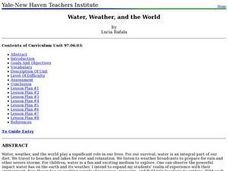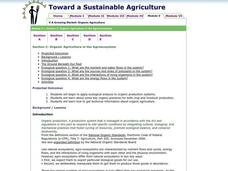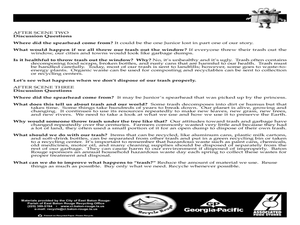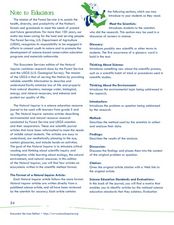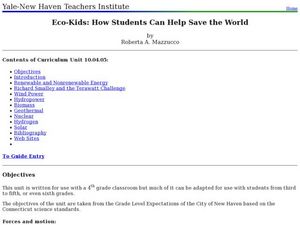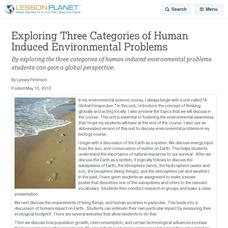Curated OER
The Greenhouse Effect
Eighth graders research the Greenhouse Effect on the Internet. They use a variety of sources and take notes on the topic. They use ClarisWorks to type a report, use spellcheck, proof and edit. They can create a class bulletin board.
Curated OER
The Dirt on Worms!
Fourth graders make predictions, observe, collect and record data. They investigate several soil and worm websites. Finally, 4th graders write a letter to The President which defends earthworms by explaining their value to the United...
Curated OER
Hazardous Waste Issues in the News
Students work together to research hazardous waste in the news. They discover how large the hazardous waste issue is. They complete an experiment and discuss how the issues affect their community.
Curated OER
Examining a Hazardous Waste Site
Students identify activities that produce hazardous waste. They examine how contaminants are spread in air and water. They work together to create a model to show how the contaminants move through water.
Curated OER
Marine & Aquatic Habitats Activities - Tidal Pools
Learners analyze the survival needs of different organisms and the conditions in a particular area that can affect these survival rates.
Curated OER
Greenewables
Students form expert engineering teams working for the (fictional) alternative energy consulting firm, Greenewables, Inc. Each team specializes in a form of renewable energy used to generate electrical power: passive solar, solar...
Curated OER
Cultural Issues
Students observe another culture using a provided simulation script and then make assumptions about that culture based on what they witnessed. They will later be debriefed and talk about the assumptions they made that were not accurate.
Curated OER
Water, Weather, and the World
Young scholars in a special education classroom examine the role of weather and water in their lives. Each day, they add a symbol for the weather outside and identify the proper activities for the weather on that day. In groups, they...
Curated OER
The Superheroes of Public Land Management
Students study public land management agencies and their missions. They research a management agency, design a superhero to represent the agency and describe the skills and training needed to manage public lands. They include the...
Curated OER
The First North Americans
Students identify and interpret the different North American Indian groups, by region, and the type and impact of their interaction with Europeans.
Then they complete an overview of one main Native American group during the age of...
Curated OER
Thinking About Technology: What Is It? How Can It Help Us?
What is technology and how can it help us? Using a instructional activity, students read a list and choose practical applications of scientific knowledge, brainstorm examples of home, school and hospital technology, graph answers in a...
Curated OER
Earth Day Crossword Puzzle
In this crossword puzzle about Earth Day worksheet, students read the descriptive sentences, use the word bank, and complete the puzzle. Students write 12 words.
Curated OER
Popular Paper
Students explore the benefits of recycling paper. In this recycling lesson, students use statistics to calculate the amount of paper that is thrown away each week and construct a graph. Students analyze the data and calculate the...
Curated OER
Toward a Sustainable Agriculture
Young scholars analyze organic production systems. In this organic agriculture lesson, students examine key organic practices for both crop and livestock. This lesson includes 5 different activities, 4 critical thinking questions and...
Curated OER
Barnegat Bay Watershed
Students design a model watershed. In this watershed lesson plan, students learn the needed parts of a watershed and how they work. Students evaluate how watersheds effect communities.
Curated OER
It's Challenging Being Green!
Students influence the plant life cycle as they take care of plants.In this caring for plants lesson plan, students understand the parts of the plant and their functions in keeping it alive. Students participate in experiments with...
Curated OER
Fitting Trash into Yesterday: A Fifth Grade Activity
Fifth graders explore the concept of waste management. In this recycling activity, 5th graders discover the history of waste management and discuss how the U.S. should respond to the issue of ever-increasing waste.
Curated OER
Chemistry: Chemical Reactions
Students investigate chemical reactions. In this chemistry lesson, students burn magnesium and record the mass. Students list five chemical reactions they see everyday.
Curated OER
African Wildlife
Students investigate the wildlife of Africa. In this animal science lesson, students view the video "National Geographic's African Wildlife" and visit websites to research additional information on the wildlife of Africa. Students...
Curated OER
Natural Inquirer Ecosystem Article Lesson
Students discover new ways to preserve the ecosystem by completing graphic organizers. For this environmental lesson, students read an article from the Natural Inquirer in small groups and fill out a graphic organizer based on the...
Curated OER
Mangrove Loss Faster than Land-Based Forests
Students explore the reasons Mangrove forests are in jeopardy. In this lesson, students read an article that discusses specific facts on Mangrove forests, then complete numerous activities that reinforce the information, such as...
Curated OER
Eco-Kids: How Students Can Help Save the World
Fourth graders identify the different types of renewable and nonrenewable energy sources. In this ecology lesson, 4th graders create models of wind mills and hydropower. They discuss the pros and cons of using alternative forms of energy.
Curated OER
I Want It! I Need It!
Students compare the difference between needs and wants. For this needs vs. wants lesson, students play a sorting game with picture cards, depicting illustrations of survival needs and material things. Students sort the picture cards...
Curated OER
Exploring Three Categories of Human Induced Environmental Problems
By exploring the three categories of human-induced environmental problems students can gain a global perspective.







